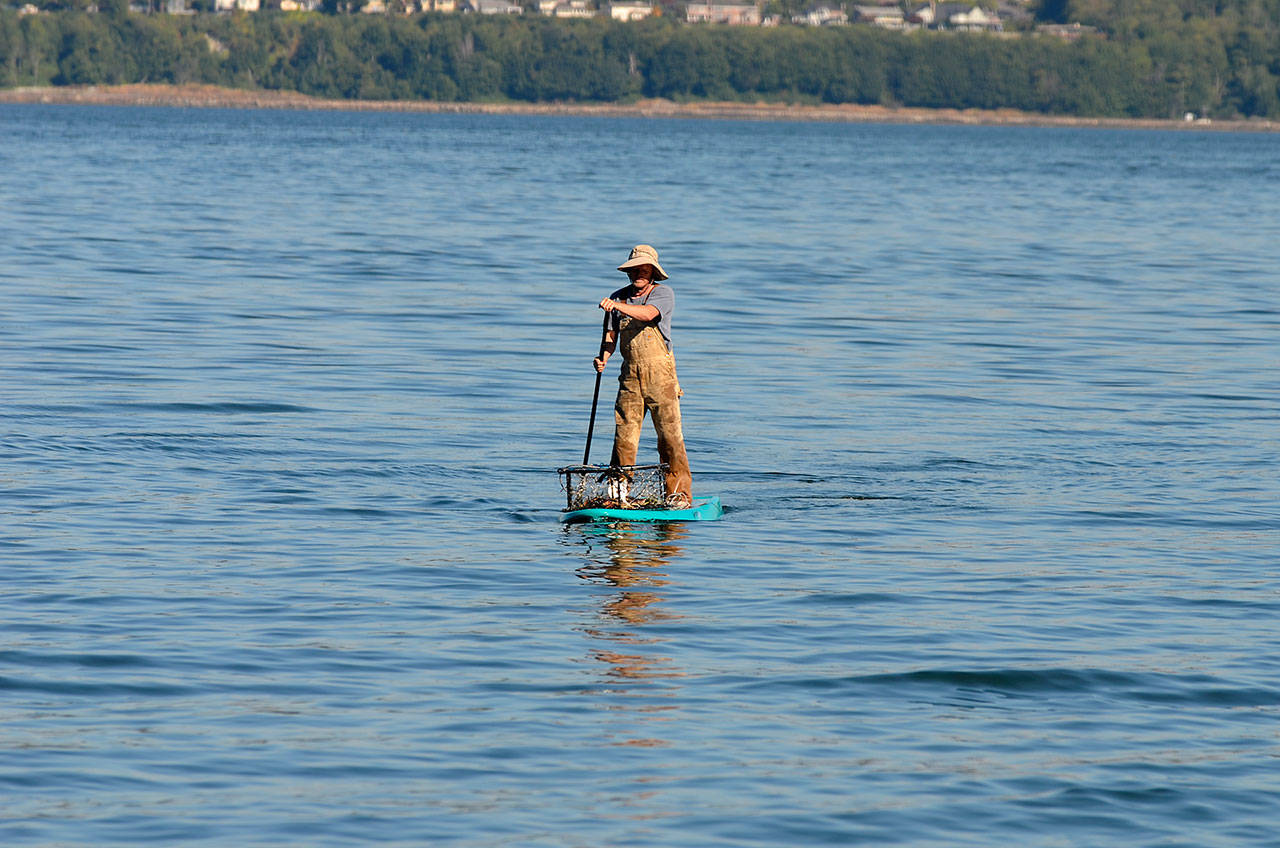For a while Clinton resident Jake Stewart dropped and collected his crab pots like most people, from a boat.
Yet, he wanted to find a way to collect his pots with less effort. The solution he stumbled upon was a bit unconventional: using a stand-up paddleboard.
“I used to use a boat to grab my crab pots, but it took a lot of time to wait in line at the boat launch and then gas it up,” Stewart said. “I then saw a friend of mine use his paddleboard to collect his pots, and I had never seen that. You don’t need a trailer, you don’t use gas and you can fit up to three crab pots on the board. It’s so much more efficient.”
Adding to the novelty is the fact that Stewart often heads out in overalls, his regular work attire. He owns and operates Sweetwater Farm with his wife, Aja Stewart.
Like the benefits of using a paddleboard over a conventional boat or skiff, using his work clothes is just easier and saves time. Efficiency is what led him to start using a board over a boat in the first place; he says by the time boaters are finally in the water, he’s already on his way back with his pots by his side.
“It’s practical and environmentally-friendly, and saving resources is really appealing to me,” Stewart said. “Every time I’m out there, people are curious and start asking me questions.”
Stewart first got into paddleboarding while living in Austin, Texas, a city where paddlers are regularly seen gliding across the river that runs through town. When he moved up to Whidbey Island to start a farm with his family, he noticed plenty of kayakers, but a lack of stand-up paddleboards. Curious residents who see him on his board regularly ask about paddling and how he uses it. It seems to have garnered more interest since he first moved to Whidbey, he says.
Stewart isn’t the only one in the family utilizing stand-up paddleboards in a novel way.
On many early mornings near Possession Beach Waterfront Park, one can find someone contorting their body as they seemingly stand on water. It’s Stewart’s wife, holding yoga poses in Puget Sound on top of a stand-up paddleboard. She’s been taking her board out “about four days a week” as the sun rises and the morning fog dissipates. The activity started as early morning paddling for a core and leg workout, but quickly turned into something more as she realized the board gives her a large enough platform to hold poses.
There’s also the added difficulty of trying to balance on the board.
Yet for her, the morning yoga sessions on the water are centered around the meditative aspect. She says the activity is “spellbinding” and puts her in touch with her surroundings. As the animals in Puget Sound go about their morning activity, she says she feels “one with nature.”
“That’s been my addiction this summer,” Aja Stewart said. “I often go out on my own for a workout, and it always becomes a spiritual and meditative practice with yoga moves sprinkled throughout the session.”
Aja Stewart is aiming to get more people out on the water to join her. She’s looking into buying more paddleboards by the time spring rolls around so she can host sunrise yoga sessions.
According to Jeff Jacobsen, part owner of Whidbey Island Kayaking, there seems to be a rise in demand for paddleboard rentals on Whidbey. While kayaking still reigns supreme, Jacobsen says the paddleboards are often completely rented out by groups. The apparent rise in popularity spurred Whidbey Island Kayaking to purchase more.
“In the three years we’ve owned the company, we’ve increased the number of stand-up paddleboards from five to eight after increased usage,” Jacobsen said. “It’s great for hot weather whenever you’d like to take a dip and a different kind of workout from kayaking.”
Although there seems to be a slight increase in paddleboard interest on Whidbey, the Stewarts hope to see a few more paddlers on the water in the coming years. While they say gliding across the river in Texas is what initially sparked their interest, they agree it’s hard to beat paddling in Puget Sound.
“We both see it as a form of meditation in a way, since you find balance with the board and the water,” Jake Stewart said. “It’s a different way to see and experience Whidbey.”


